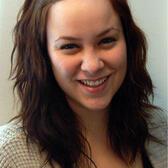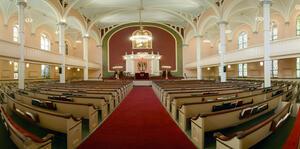Is the shul a place for political activism?
I spent last Friday night celebrating Shabbat at Temple Ohabei Shalom in Brookline, Mass., a Reform synagogue I’d never before visited. I was in awe of the chapel’s breathtaking, brightly colored stained glass windows, and I was fascinated by Rabbi John Franken’s take on Parshat M’tzora, which drew unexpected parallels between, of all things, skin diseases and marketing (all with a Jewish bent, of course). But it was a bright green insert in the Friday night program that struck me most.
The small flier from Mass Equality was part of the Boston-area progressive faith community’s coordinated, interfaith efforts to secure equal rights for Massachusetts’ transgender population. It asked attendees at services to write to their state legislators in support of the Transgender Equal Rights Bill, which would add gender identity and expression to the state's existing non-discrimination laws affecting employment, housing, public accommodations, education, hate crimes and credit.
A study published by the National Gay and Lesbian Task Force reports that approximately 76 percent of Massachusetts’ transgender residents face harassment in the workplace and 20 percent have been fired from a job for being transgender. With statistics like these in play, Massachusetts Governor Deval Patrick recently signed an executive order protecting transgender state employees from discrimination – a and though it’s a heartening step toward full civil rights, transgender residents still face debilitating discrimination in other areas of life and work. The insert in Temple Ohabei Shalom’s Shabbat service program read, “As a person of faith, I affirm the dignity of each and every human being and recognize our connection to one another. My faith tradition and moral vision compel me to act on behalf of those who face persecution and violence. All people should be able to work and live without fear of discrimination or harm” and indicated support for the Transgender Equal Rights Bill. Rabbi Franken told the congregation that Mass Equality would send all completed petitions to state legislators.
As someone who connects most closely to my Judaism through social justice and community engagement, I was delighted to see a congregation highlighting social advocacy front and center at Friday night Shabbat services. In my experience, so many congregations see the crux of social action as being volunteerism: serving meals at soup kitchens, building homes with Habitat for Humanity, cleaning up local parks. Though dedicated to the direct service aspect of these causes, congregations are often reluctant to address the public policy side of social action by working to correct the underlying root of the problems their volunteerism addresses – problems like hunger, homelessness and climate change. So often, congregations shy away from anything that may entail contacting Congress, participating in rallies, and anything else that could be construed as political and therefore controversial.
Certainly, serving soup kitchen meals is a mitzvah, or a good deed, one that directly helps and serves people in desperate need. But advocating for true systemic change is the best way to make a lasting difference, and the only way to do this is by addressing the root of the problems – which, all too often, exists at the governmental level. Worried about the separation of church and state? This constitutional mandate exists to prevent the government from requiring religious practice or integrating religion into law. The good news is that there’s absolutely nothing illegal or unconstitutional about being driven by your Jewish values to become an activist for the causes that matter to you – and this goes for individuals as well as congregations. (If you’re interested in learning more, Interfaith Alliance’s “Religion and Politics: A Guide for Houses of Worship” goes more in depth about what is and isn’t OK.)
One of the greatest things about Judaism, I think, is that its adherents practice in a variety of ways and find value in different aspects of its traditions and texts. With this in mind, I’m curious as to your experiences at the intersection of social action and Judaism. Would you be pleasantly surprised, like me, or perhaps distinctly uncomfortable to be presented with such a flier at Friday night services? Is social action a way in which you meaningfully connect with your faith? If so, do you prefer direct service, advocacy, or some combination of the two?








Is the shul a place for political activism?
Yes!
Thank you for your kind words about Ohabei Shalom.
L'Shalom, Daniel W. Krueger Recording Secretary Chair, Ritual and Worship Temple Ohabei Shalom Brookline, Massachusetts - Massachusetts' First Synagouge